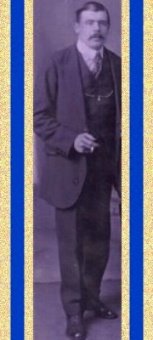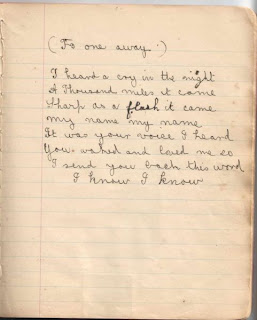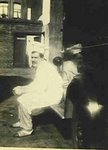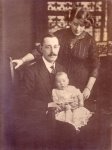
On one February morning F.A.I.s nephew
Sidney Davis (aged 5) went out to play and
did not return.
Several newspaper articles were retained by his mother
Ethel and latterly by his sister Babs, which describe the search.
HAMPTON- CHILD MISSING -Widowed Mother's Increasing Anxiety
Much anxiety is felt concerning the mysterious disappearance of a little boy named Sidney Davis, aged 5, the son of Mrs Davis, a widow of the River Tearooms, 23, Church Street, Hampton.
The little fellow left his home about 10 o’oclock on Monday morning to play, and is stated to have been last seen a little later going in the direction of Hampton Court with another little boy somewhat bigger than himself. Little Sidney Davis was a very intelligent child for his age. He was full faced, of fair complexion and was wearing a grey tweed overcoat, red jersey, brown cloth knickers, grey socks, high laced boots, red cap with two tassels, grey woollen gloves and a white scarf.The missing child is said to have been fond of playing near the river, and it is thought that he might have gone on the recreational ground for that purpose. The river has been dragged, but without result.
The police and Boy Scouts have made an exhaustive search of the district, including Bushy Park.
BOYS STORY OF MISSING CHILD
A statement supporting the theory that the little child, Sidney Davis, who has been missing since Monday in the last week, has been kidnapped, has been made by a boy named Greengrass, aged 13, of 19, Malvern Road. The boy who is the son of a local police constable, and knows the missing child well, declares that about one o’clock on the day on which he was missed he saw him near the entrance of Bushy Park, opposite the recreational ground, in the company of a woman, who also had with her another little boy aged about seven.
The woman who was of medium height and of dark complexion, appeared to be amused at some antics the missing child was going through at the time. On going back about 10 minutes later in order to give the little fellow a ride home on his bicycle he found that he had disappeared and also the woman and the other child. Greengrass who belongs to the Church Lads Brigade, was very much attached to the missing child and had recently taken part with him in a childrens performance in connection with the Church Sunday School. The boys statement was communicated to the police, who, however, do not attach any importance to it.

He was found eventually tragically he had drowned in the Thames. I don’t think that the whole circumstances surrounding his disappearance were ever fully known?
His mother and his sister remained in London for a few years after this tragic event but with siblings already over in Australia a decision to break with past griefs and to make a new life was made.
‘Only graves here’ Ethel was known to have said.
The booking to leave Britain was made but it took a whole year to hear if they were going. In notes made by Babs many, many years later in Australia she recalls
‘we spent a lot of time with a good brother and wife in Liverpool – my favourite Uncle F.A.I.’
Babs died just a couple of years ago, she had a full long life in Australia.
Her family brought her ashes home to rest in London alongside her dear brother ‘Siddy’
(Many thanks to PM and her family for the information)
In tender memory of our beloved Siddy,
Who passed away February 24th 1916
Aged 5 years
"Adieu sweet flower nipped in the bud, so loving sweet & fair"
"Lost a while our treasured love, gained forever, safe above"
Two desparately tragic deaths in the family at the start of 1916

































































